The Enchanted Pursuit: Apollo and Daphne’s Fated Dance
Reading Time: 11 min
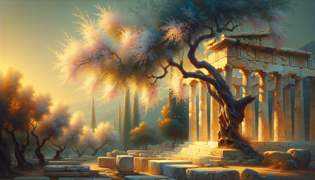
About Story: The Enchanted Pursuit: Apollo and Daphne’s Fated Dance is a Myth from greece set in the Ancient. This Poetic tale explores themes of Romance and is suitable for All Ages. It offers Inspirational insights. An ancient Greek myth of fervent desire, heart-wrenching escape, and the transformative power of nature.
Introduction
In the heart of ancient Greece, where every stone seemed to hum with the whispers of old gods, the land basked in the gentle caress of golden sunlight. Olive groves and wild myrtle intertwined with marble columns and the soft murmur of distant fountains. Here, among the radiant beauty of sunlit terraces and softly undulating hills, the myth of Apollo and Daphne began its tender verse. Apollo, the radiant god of the sun and music, strode with a brilliance that rivaled the noonday sky, his steps imbued with the promise of art and prophecy. Yet, even the light of the most splendid star casts shadows when confronted with the murmur of longing and the sting of unrequited affection.
Daphne, a nymph as elusive as the mountain mist, moved like a gentle breeze through the sacred groves. Her eyes were a quiet reflection of the deep blue Aegean, and her laughter, soft as the rustle of olive leaves, belied an inner strength rarely seen in those tied to mortal fates. As the warm daylight flooded the hidden paths of the ancient forest, their lives became inexorably intertwined—a dance of pursuit and evasion where the heart’s desire and the natural world clashed in poignant turbulence. The stage was thus set, in a realm where divine brilliance met the unyielding spirit of nature, where love, as transformative as the turning of the seasons, would carve its legacy into eternal stone.
The Golden Hunt
Apollo, resplendent in the glory of the sun, was ever the embodiment of poetic majesty. Each stride he took exuded an energy that both awed and commanded. His chariot, drawn by silver-hued horses, carved paths through the azure skies as he pursued both mortal quests and divine passions. On one particular day, the winds of fate stirred a longing within him that he had not known before—a desire as fierce and radiant as the noonday sun. In the luxuriant forests bordering the gleaming Aegean coast, his eyes fell upon Daphne, a nymph whose every gesture mimicked the grace of the natural world. Her presence was like an enchanting melody, stirring memories of spring’s first bloom.
As Apollo advanced, his golden eyes fixed on Daphne with a mixture of admiration and yearning. He approached the elusive nymph with carefully chosen words, each syllable laden with both divine authority and human tenderness. "Fair Daphne," he intoned, his voice echoing softly like the whisper of a lyre, "your beauty transcends mortal realms. It is as if the gods themselves fashion your every step, each a delicate work of art." But the radiant charm of Apollo, though awe-inspiring, was perceived by Daphne as an overwhelming force—a pursuit that threatened her freedom and the sanctity of her nature.
Daphne, sensitive to the approaches of both gods and fate, sought refuge in the quiet majesty of her surroundings. The forest, with its ever-present hum of life and gentle rustling leaves, became her sanctuary. The sparkling dewdrops on the laurel leaves glistened in the sunlight, echoing her inner turmoil. Despite the gentle lilt of Apollo’s words, a disquiet settled in her heart; for she felt a deep responsibility to the wild and her elemental freedom, a freedom that bound her to the ancient earth rather than the transient delights of divine affection.
Thus began a dance of emotions—a chase where desire clashed with the sanctuary of nature. Apollo’s light, though captivating, seemed at times too luminous for Daphne’s quiet world. His every gesture carried the weight of destiny, yet for Daphne, it was a reminder of the delicate boundary between the divine and the mortal. The scent of wild jasmine and the rustle of cedar leaves provided the backdrop for this unfolding drama, as Apollo pressed on with a blend of passion and respect, unwilling to relinquish the pursuit of a love that might transform both their souls forever.
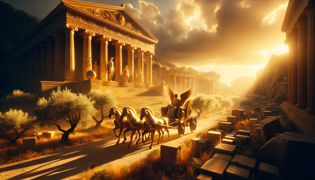
The Flight of Daphne
Daphne, with her heart pounding like the rhythm of ancient drums, fled from the relentless ardor of Apollo. Each step she took carried the weight of her heritage—a legacy intertwined with the wild embrace of nature. In the lush, verdant woodlands, where sunlight danced playfully between the clusters of leaves, Daphne’s flight was both graceful and desperate. The air was perfumed with the aroma of blooming myrtle and laurel, a heady reminder of the earthy wonders that sustained her spirit. She dodged beneath ancient arches, and sprinted past cascading streams that reflected the shimmering light of a benevolent sun.
Yet, even as she ran, her thoughts were a tumult of conflict and sorrow. The soft whisper of the wind spoke to her of freedom, the ancient oaks murmured secrets of endurance, and the gentle trickle of nearby waters sang of inevitable change. Apollo’s impassioned pleas, though resonant with celestial beauty, echoed behind her like distant thunder—a reminder of her inescapable fate. She dared not turn back, for to do would invite the binding chains of love she so fiercely feared. Daphne’s determination was not born of disdain for the god’s power, but rather from a deep-rooted need to preserve her autonomy and union with the earth.
As the forest thickened, the terrain became a labyrinth of twisting paths and hidden clearings, each one echoing the ancient lore of nymphs. The golden sunlight peered through the dense canopy, casting dancing shadows that both sheltered her and hinted at lurking mysteries. In her solitude, Daphne’s thoughts turned inward; memories of blissful moments amid nature’s bounty filled her mind, mingling with a growing realization: that true beauty lay not in the possession of another, but in the unbridled, wild essence of self. The rustling grapevine, the murmur of a quiet brook, and the persistent scent of earth in bloom all bore witness to a transformation that was quietly unfolding—a metamorphosis wrought by the very forces that defined her being.
Now, every footstep was emboldened by the resolve of a spirit determined to remain untouched by the overwhelming luminosity of divine devotion. In that timeless moment, as the world around her shimmered with the pure light of nature’s embrace, Daphne resolved to seek solace in the one constant that had always been hers—the eternal, nurturing earth.
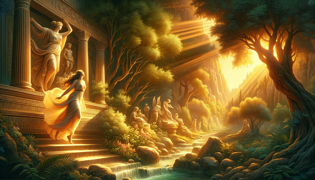
The Blossoming of Fate
In the midst of her frantic escape, fate wove its delicate tapestry with threads of both mercy and regret. As Apollo closed the distance between desire and destiny, the earth itself stirred to intervene in this cosmic pursuit. The ancient gods, ever watchful of mortal hearts entwined with divine passion, whispered to the winds and kindled a transformation in Daphne that would forever etch her name in the annals of myth.
The forest trembled as if in response to an unseen prayer. Blossoms erupted along the winding paths, and the vibrant greens of the ivy and laurel coalesced into a radiant mosaic of nature’s artistry. Daphne, caught in the inescapable pull of destiny, felt the very fibers of her being twine with the elements around her. With each heartbeat, a strange and soothing sensation enveloped her—a mingling of sorrow and serenity. It was as though the earth cradled her, preparing her for a transformation that would release her from the clutches of mortal despair.
Apollo, witnessing this surreal metamorphosis, felt an ache within his divine chest. His pursuit, once filled with unchecked ardor, now bore the weight of mourning. The clear, bright skies turned into a silent canvas upon which the tragedy of unrequited love was painted with gentle, somber strokes. He reached out, his hand trembling not with anger but with the pain of a hope stubbornly clinging to existence, hoping to arrest the transformation. Yet, the forces of nature moved inexorably. Daphne’s form began to shimmer as delicate tendrils of ivy and laurel wove themselves around her limbs, softening her features into those of a blossoming tree.
In that poignant moment, under a canopy of radiant light and tender hues, the two divine beings were forever separated by the cruel miracle of transformation. The god’s heart sank with the realization that his celestial brilliance could neither capture nor contain the wild spirit that was Daphne. The forest, with its gentle hum and ancient wisdom, became the final arbiter of their fates—a silent witness to the love that was as beautiful as it was unfulfilled.
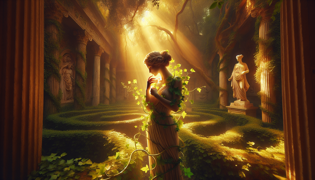
Echoes Through Time
The transformation of Daphne marked not only the end of one divine pursuit but also the beginning of a legend that would echo through the ages. As centuries passed, the grove where she had metamorphosed into a laurel tree became hallowed ground—a living monument to the enduring spirit of love and the indomitable power of nature. Apollo, now both mournful and enlightened by the bittersweet aspect of destiny, wandered under the arching boughs of the divine tree, his reflections a mixture of regret, admiration, and eternal hope.
In moments of solitary dawn, Apollo would stand beneath the swaying branches, the gentle susurrations of the leaves reciting a hymn of remembrance. The light of morning, pale yet hopeful, bathed the monument in a soft, ethereal glow that spoke of renewal and timeless grace. Pilgrims and poets would later come from far and wide to pay homage to this sacred place, finding solace in the tender reminder that even in love’s most unyielding pursuits, beauty and transformation can be found.
The legacy of Daphne’s transformation grew into a symbol of both loss and redemption—a testament to the fierce protection of one’s true nature against even divine interference. In an age where gods walked among mortals and emotions were as palpable as the earth beneath one’s feet, their story served as a poignant reminder that the heart’s deepest desires sometimes lead to irrevocable change. Apollo’s sorrow, etched into the lines of his immortal face, gradually transformed into a quiet wisdom—a reverence for the mysterious interplay between love and the natural world.
The story of Apollo and Daphne continued to be told in hushed tones during twilight gatherings, in verses sung by wandering bards, and in the delicate carvings that adorned temple walls. It was a tale steeped in the warmth of golden light, yet shadowed by the melancholic beauty of an unreachable love. Generations carried forward the tale, each retelling a blend of sacred ritual and tender memory, a perfect balance of divine luminescence and the evergreen humility of nature. Thus, through every passing season and every shifting horizon, Daphne’s spirit remained immortal—a living echo of a love that dared to transcend the very bounds of destiny.
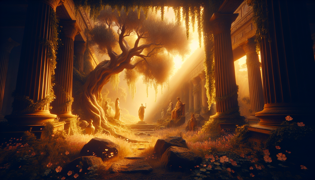
Conclusion
As the golden days waned into the gentle hues of twilight, the myth of Apollo and Daphne revealed its timeless moral: that the pursuit of love, in its most desperate and beautiful forms, often demands sacrifice and transformation. Apollo, once the vibrant symbol of unfettered divine passion, came to understand that even immortals must honor the sanctity of free will and natural order. His eternal grief intertwined with a newfound reverence, as he dedicated his art and poetry to celebrating the indomitable spirit that Daphne embodied.
In the quiet recesses of his boundless heart, Apollo kept alive the memory of the nymph who had become one with the earth—a symbol of nature’s unyielding resilience against the constraints of fate. He traveled far and wide, sharing his sorrow and wisdom with those who had the heart to listen. Like a soft echo across the ages, the tale of Daphne’s transformation inspired mortals and deities alike to embrace change, to honor the beauty of unrequited love, and to cherish the freedom that lies within each soul.
The laurel tree stood as a living archive of these ancient truths—a gentle guardian of memories and a timeless emblem of love that transcended the mortal coil. In every rustle of its leaves and in every shaft of light that filtered through its boughs, the story whispered on, urging all who encountered it to marvel at the delicate balance between desire and destiny. Thus, amidst the eternal cycle of day and night, hope and loss, the legend lived—a divine reminder that even the most passionate pursuits can yield an enduring gift: the transformative grace of nature, eternally unfolding in silent, luminous beauty.

















